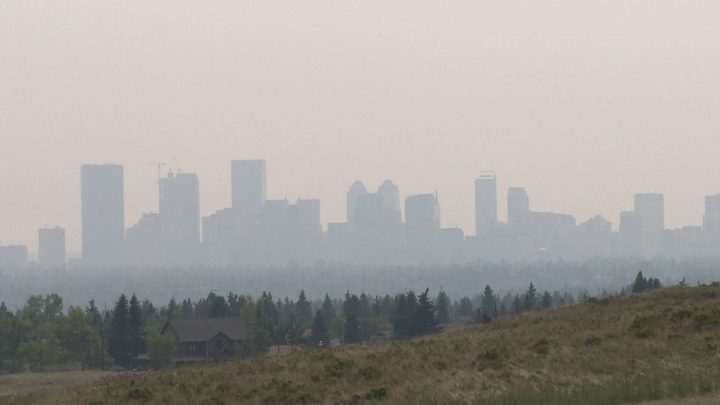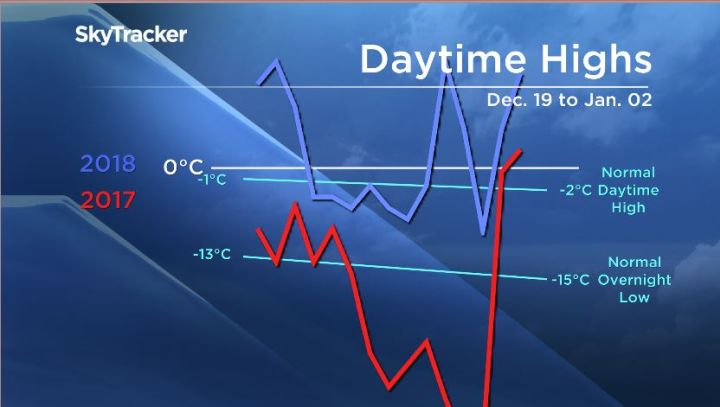Environment Canada puts out a top 10 list for weather stories at the end of every year, covering significant or unusual weather stories across the country.

Here at Global Calgary, we compiled our own list: the top five weather stories for our city of 2018.
Number 5 – The Smokiest Summer
Coming in at fifth spot was a story that ranked number one nationally for Environment Canada — smoky skies.
Despite a late start, British Columbia experienced the worst forest fire season in history last year, with over 2,000 wildfires igniting. The smoke from those fires could be seen across the country spanning from Victoria to as far away as Lake Superior.
According to Environment Canada, more than 10 million Canadians were breathing in particulate this summer due to the B.C. fires.
Here in Calgary, a record number of smoke hours were recorded, making 2018 the smokiest summer on record. Between May and the end of September, 451 hours of smoke were recorded, crushing the previous record of 315 hours set in 2017.
Calgary will typically see about 25 smoke hours per summer.
Number 4 – The Fall That Never Was
Calgary kicked off September with a thud. The city saw trace amounts of snow Sept. 13, but the bigger story was how cold it was.

Get breaking National news
From the middle of September to the middle of October, Calgary experienced daytime highs well below the seasonal average, with only six days above 10 C and 15 days with highs below 5 C. Outdoor events were postponed and Calgarians were forced to bundle up as they dealt with over four weeks of frigid temperatures.

Some daytime highs were more than 15 degrees below seasonal during this period of time. The average daytime highs between September 12 and October 13 are between 18 C to 13 C.
Number 3 – Snow Woes
Despite a cooler winter and a wet spring, Calgary actually enjoyed a warm summer. This was not extended into the fall, though. Calgary set a new snowfall record for the month of October after receiving nearly five times the monthly average amount of snow.
Three months saw significant snowfall totals in Calgary in 2018. February brought nearly triple the monthly average amount of snow, with snow falling on 20 out of 28 days that month
March kicked off with the snowiest start on record, recording nearly double the monthly average by month’s end.
Deep snow on chair in northwest Calgary.
Number 2 – Hottest Day
The summer heat wave also made the number two position on the Environment Canada top weather story list for 2018. Most of the country experienced an unusually warm summer this year, with stretches of daytime highs into the mid to high 20s.
Canada nearly broke the all-time top temperature nationally, when Moose Jaw recorded a high of 42.3 C on Aug. 11. The Canadian record high is 44.3 C.
- Iconic Calgary cookhouse and dance hall will be relocating in 2027
- Alberta man with 25 outstanding warrants climbed down balconies to flee officers: police
- ‘Need to do things differently’: Alberta police services look to AI for future
- Heavy snowfall, high wind warnings issued for much of southern Alberta
Calgary did break an 85-year “hottest day ever” record when it hit a high of 36.5 C on August 10.
July and August were quite warm this year in Calgary, with a total of eight days above 30C, and 31 days where the temperature hit at least 25 C.
Number 1 – Never-Ending Winter
The weather story that seems to really stick in Calgarians minds is how cold and extreme the past winter was. Technically the winter season is considered to start in December and end in February, so for the purpose of this story we are going to include a bit of data from the end of 2017.
Starting Dec. 19, 2017, Calgary had a run of temperatures that were well below seasonal. Some days were more than 23 degrees below average, with overnight lows into the mid -30 C range and windchill values below -40.
Many outdoor events this past winter had to be cancelled or modified, including the New Year’s Eve celebrations in downtown Calgary. Snowfall totals were excessive in December 2017 and minimal in January 2018, but the cold was unrelenting.
For the final week of December 2017, the temperature did not make it above -16 C, and from Jan. 31, 2018 to Feb. 9, 2018, the warmest it got in Calgary was -8 C.
Want your weather on the go? Download Global News’ Skytracker weather app for IOS and Android.












Comments
Want to discuss? Please read our Commenting Policy first.